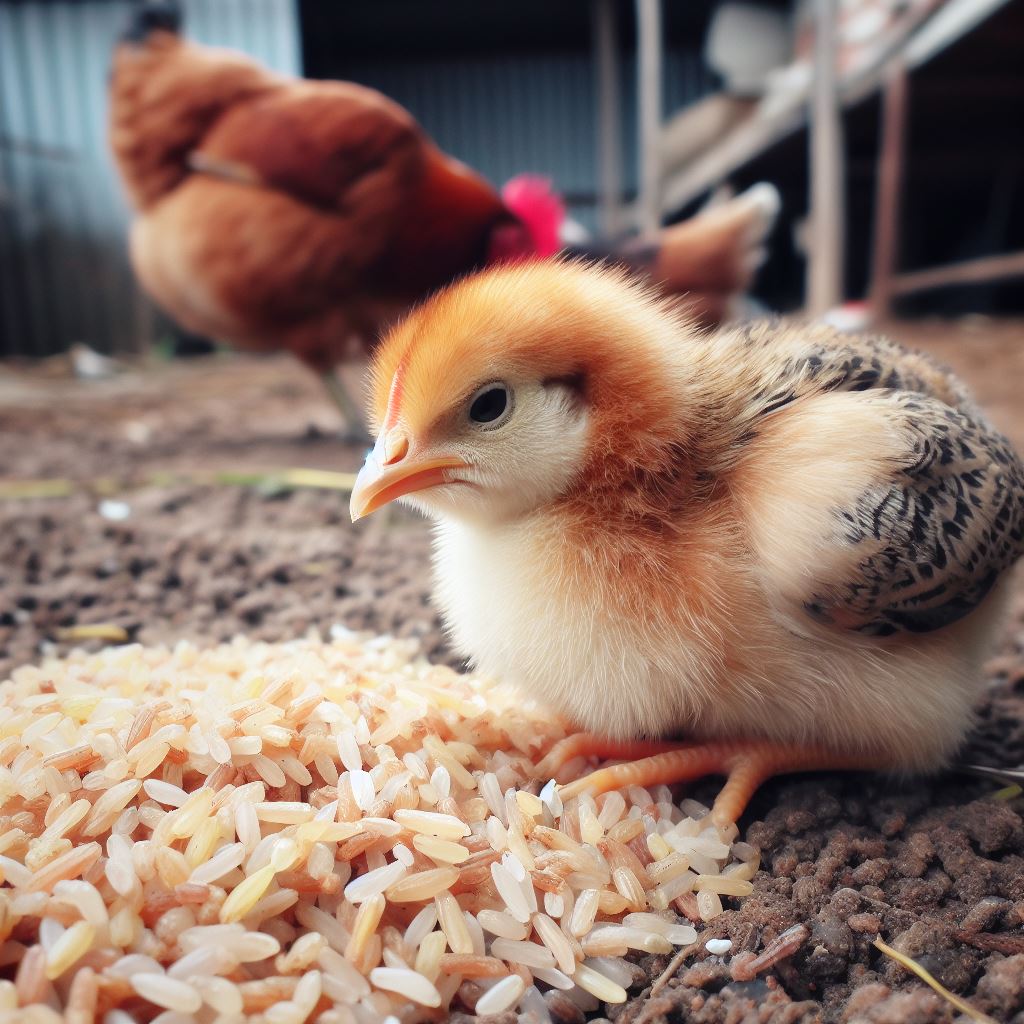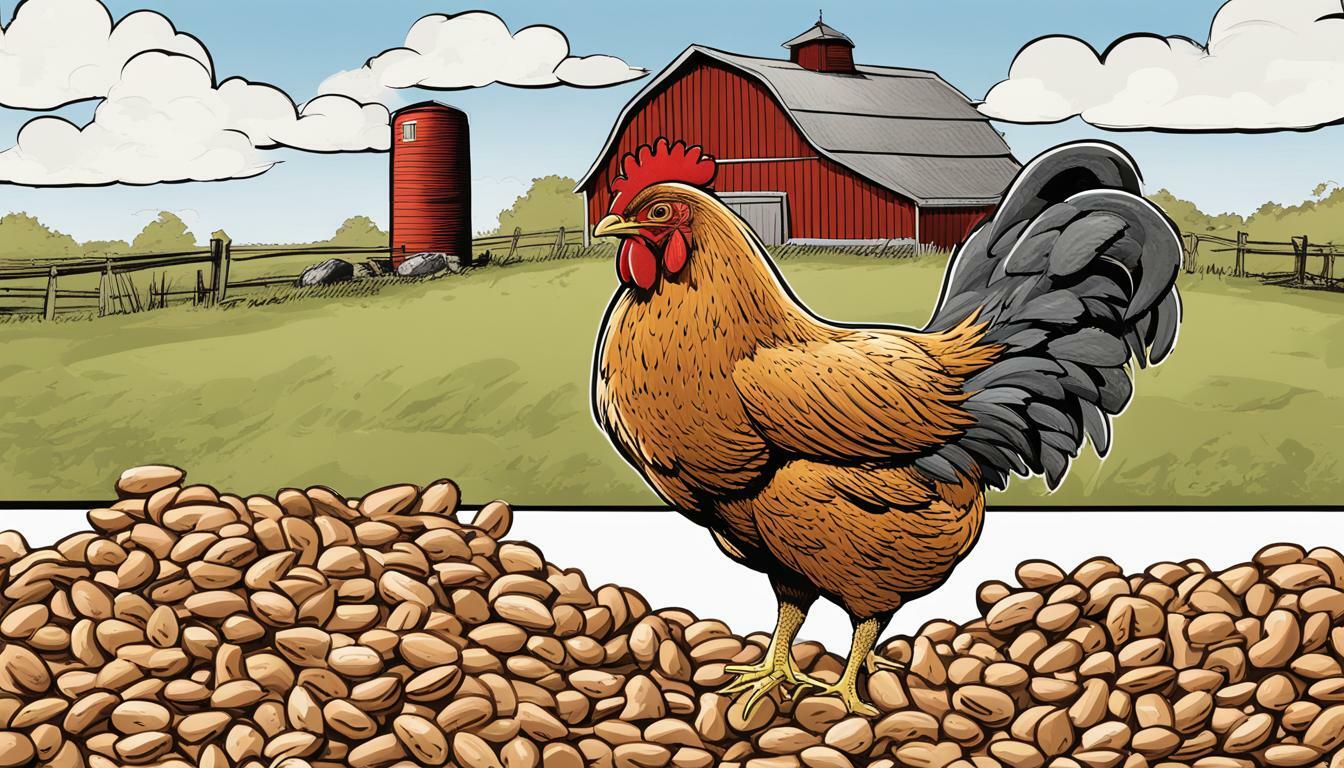Can Chickens Eat Cherries? Benefits, Risks, and Feeding Tips
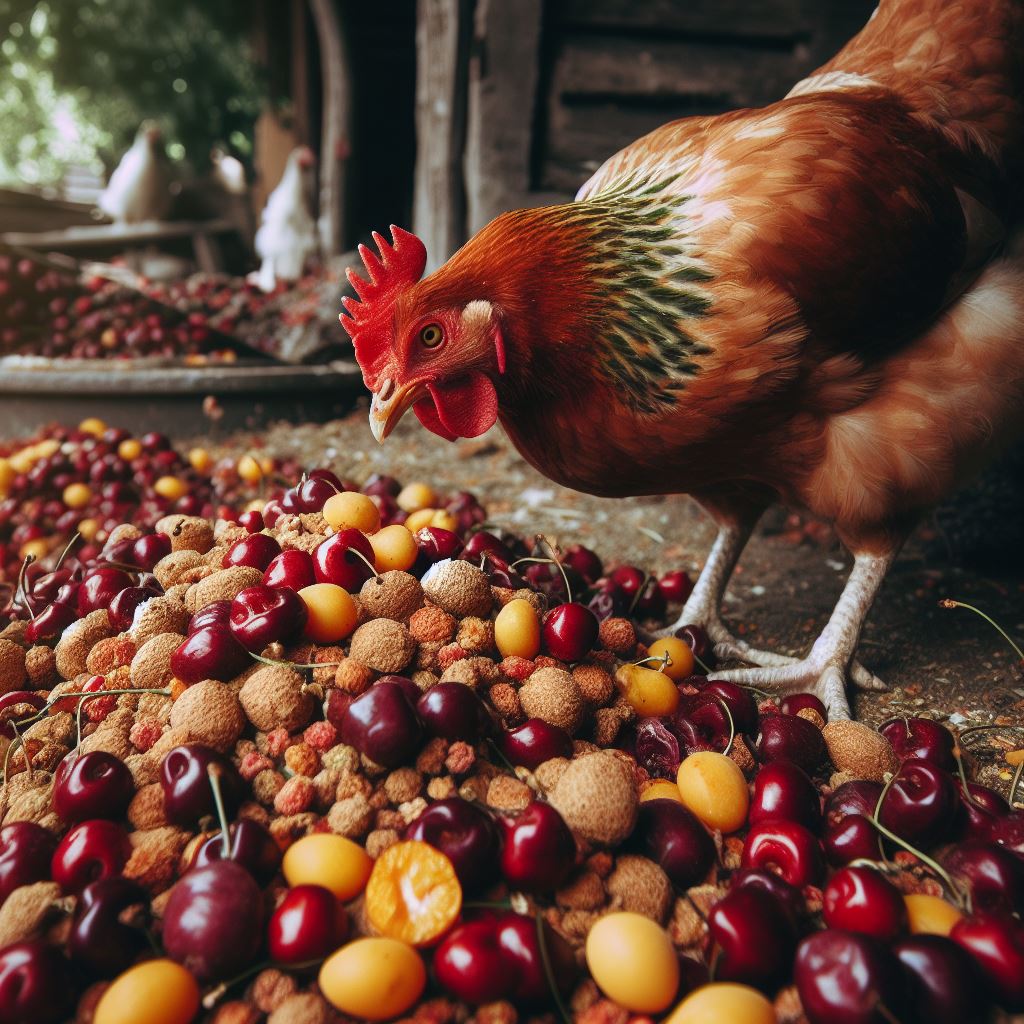
Table of content:
Cherries make for a sweet, delicious snack for humans. But what about chickens – can chickens eat cherries safely? As a chicken owner, you likely want to provide your flock with nutritious, diverse foods while avoiding anything potentially toxic.
This article provides a comprehensive guide on feeding cherries to chickens, including the nutritional benefits, which parts to feed, safe serving methods, and more.
Feeding Cherries to Chickens
With their bright red color and sweet, tangy flavor, cherries are a beloved summer treat. Cherries contain essential vitamins and minerals that can benefit chickens as part of a balanced diet. Offering scrumptious fruit like cherries can also make for enriching foraging opportunities.
However, chickens have different nutritional needs than humans. Not all people’s food is suitable for chickens. As a responsible chicken keeper, it is important to understand what human foods, including fruits like cherries, are safe and nutritious for chickens to consume.
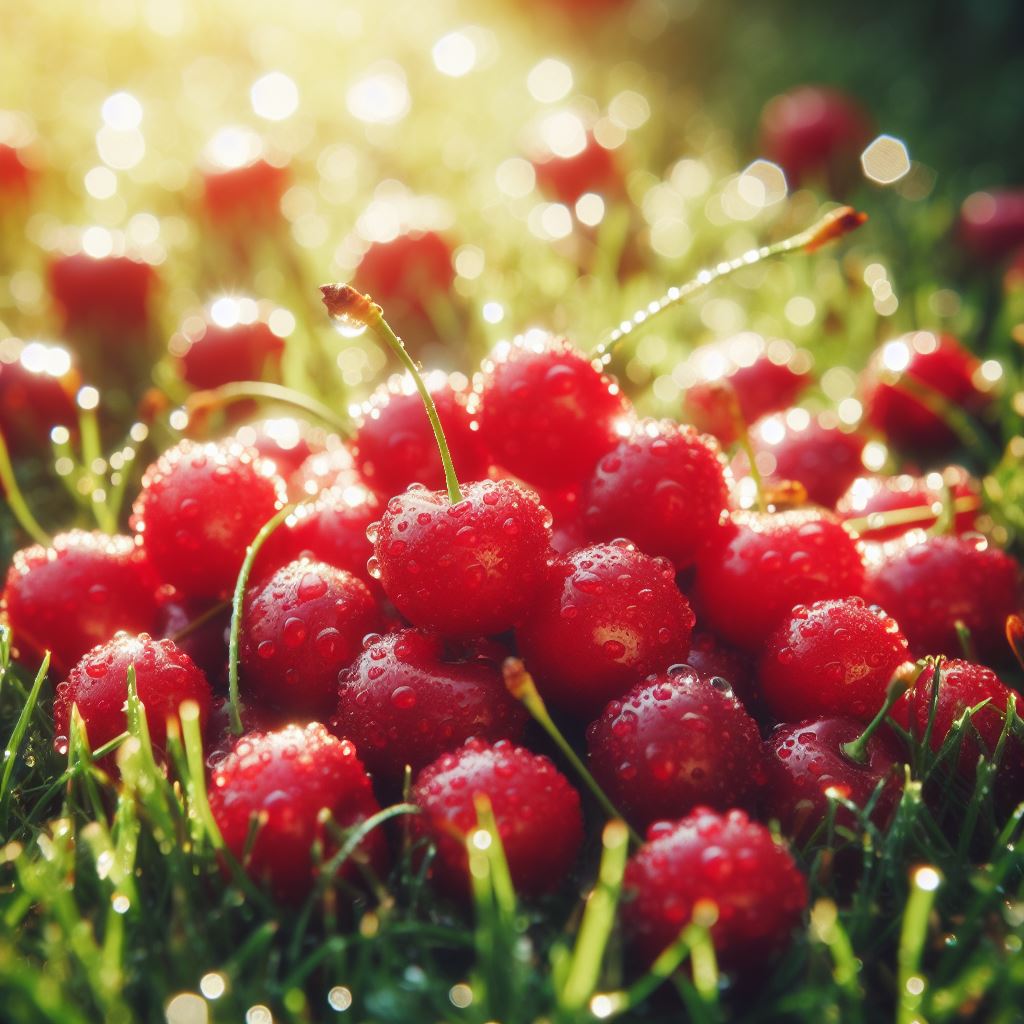 The Nutritional Benefits of Cherries for Chickens
The Nutritional Benefits of Cherries for Chickens
Cherries contain an array of vitamins, minerals, and antioxidants that can promote overall health in chickens when consumed in moderation. Here are some of the top nutrients found in cherries that chickens can benefit from:
High Bioavailability of Essential Nutrients
Cherries contain many nutrients chickens require in highly bioavailable forms, meaning chickens can efficiently absorb and utilize them. For example:
- Vitamin C – Necessary for collagen production and immunity. Cherries provide 9.7mg of vitamin C per cup.
- Vitamin A – Critical for vision, growth, and egg production. Cherries contain vitamin A in the form of beta-carotene, which chickens can easily convert to a usable form.
- Magnesium – Needed for eggshell formation, nerve functioning, and over 300 enzymatic reactions in the body. Cherries contain 12mg of magnesium per cup.
Rich Sources of Iron and Copper
Cherries provide two key minerals:
- Iron – Required for blood health and oxygen transport. Dried cherries contain 4mg of iron per cup.
- Copper – Plays roles in melanin production, connective tissue strengthening, and protection against free radicals. Cherries provide 128mcg of copper per cup.
Other Fruits Chickens Can Eat
In addition to cherries, chickens can enjoy a variety of other fruits in moderation, including:
- Strawberries
- Raspberries
- Blackberries
- Watermelon
- Cantaloupe
- Apples
- Pears
- Peaches
Offering a diverse mix of fruits can give chickens’ diets a healthful boost.
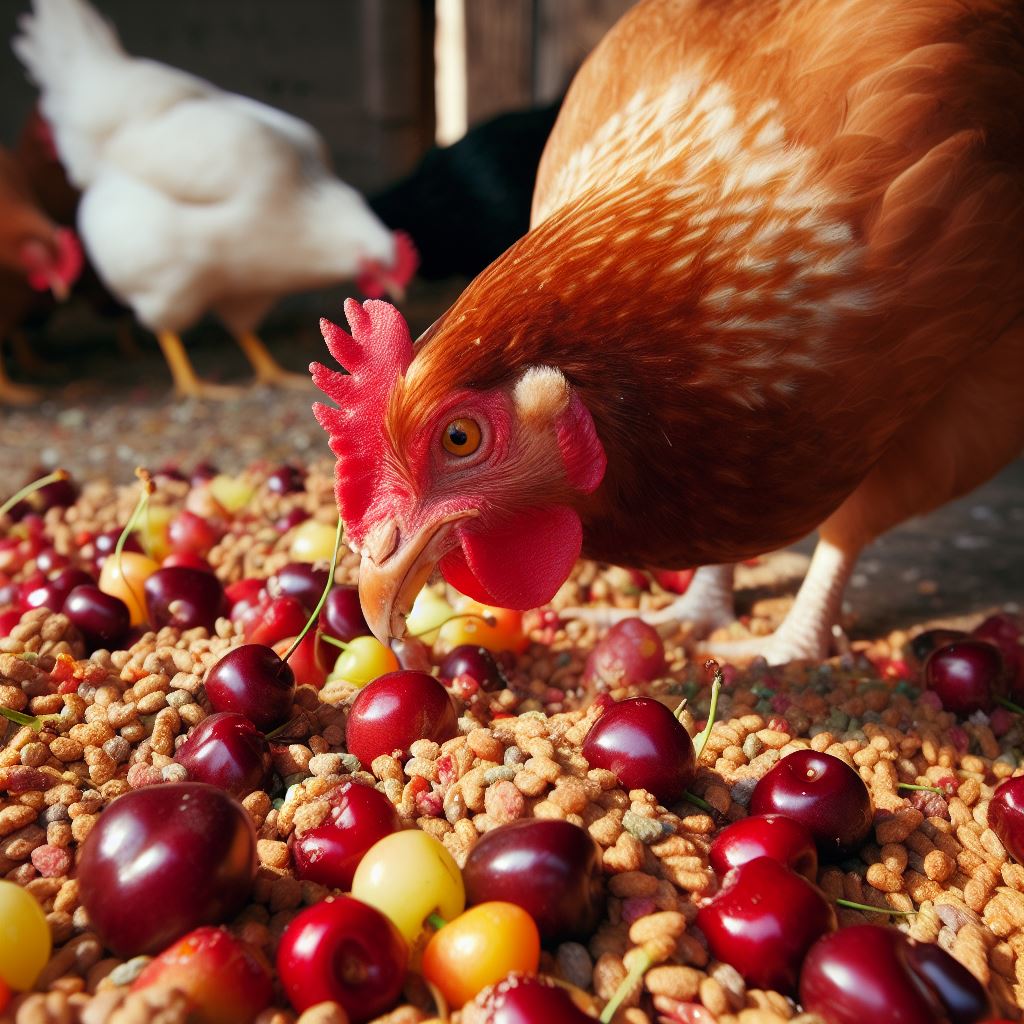 Can Chickens Eat Cherries?
Can Chickens Eat Cherries?
Now that we’ve covered the nutritional perks, let’s get to the pressing question: is it safe for chickens to eat cherries?
Yes, Chickens Can Eat Cherries Safely
Both sweet and tart cherries are non-toxic for chickens. The fleshy part of cherries is completely edible and safe for chickens to consume.
Cherries make a tasty, low-calorie treat. Their mildly sweet flavor and popping texture when ripe can be exciting for chickens to forage or eat from your hand.
Moderation is Key
While cherries themselves are not toxic to chickens, they should be fed in moderation. Cherries should comprise no more than 5-10% of a chicken’s total daily food intake.
Overindulging in sugary fruit can cause diarrhea, upset stomach, obesity, and other health problems in chickens. Be sure to give cherries sparingly as a supplement to a chicken’s normal feed.
Baby Chicks Cannot Handle Too Many Cherries
Baby chicks under 4 months old do not have mature digestive systems. They should not eat more than a cherry or two per day. Too much fruit can overwhelm their developing guts.
Cherry Pits Contain Cyanide and Should Be Removed
While the fruit itself is fine, cherry pits contain a form of cyanide called amygdalin. Swallowing cherry pits can be toxic. To safely feed cherries to chickens, be sure to pit them first.
Parts of Cherries That Are Safe for Chickens to Eat
Chickens can safely enjoy specific parts of cherries:
The Flesh is Nutritious and Delicious
The flesh or pulp of cherries has a sweet, tangy flavor. It contains the abundant vitamins, minerals, and plant compounds that make cherries nutritious. The flesh is perfectly safe and healthy for chickens to eat.
The Skin Contains Fiber and Phytonutrients
Cherry skin boasts fiber, antioxidants, and other beneficial plant compounds. Leaving the skin on provides extra nutrition and enrichment.
Stems and Leaves Should Be Avoided
The stems, leaves, and pits of cherries should not be consumed by chickens. These parts offer little nutritional value and may cause illness or even death if consumed in large quantities. Be sure to pit cherries and avoid giving chickens the stems and leaves.
Are Cherries Good for Chickens?
Now let’s explore the pros and cons of feeding this sweet, vibrant fruit to chickens:
Cherries Can Provide a Tasty, Low-Calorie Treat
In moderation, cherries offer chickens a way to indulge their natural foraging instincts while getting low-sugar, low-fat nutrition. The pleasant taste can bring them joy.
Cherries Should Not Replace Chicken Feed
While nutritious, cherries lack the complete nutrition chickens need from feeds specifically formulated for them. Cherries should never make up the bulk of a chicken’s diet or replace their normal feed.
Cherries Can Encourage Natural Foraging Behaviors
Allowing chickens to forage for fallen cherries or peck cherries from your hand mimics their natural feeding behaviors. This enrichment can benefit their mental health.
Overall, cherries make a safe, nutritious occasional snack that offers mental and dietary enrichment in small portions. They should not become dietary staples.
How to Feed Cherries to Chickens
If you want to share cherries with your flock, follow these tips for safe serving:
Cut Cherries Into Smaller Pieces for Easier Consumption
Whole cherries may pose a choking hazard, especially for smaller breeds. Cut cherries into quarters or halves before feeding them to chickens.
Dried Cherries Are Worry-Free
The drying process concentrates nutrients while removing pits and stems. Dried cherries are easy to feed without prep. However, limit dried cherry treats due to their higher sugar content.
Pit Cherries Before Feeding to Avoid Choking Hazards
Cherry pits can get lodged in chickens’ throats or impact their digestive tracts. Removing pits eliminates this danger. Use a cherry pitter or carefully slice pits out with a paring knife before feeding cherries to chickens.
Whole Cherries Can Be Fed With Caution
If you wish to give chickens whole fresh cherries, monitor them closely as they eat to be sure they swallow the cherries fully without issue. Break cherries into smaller pieces if chickens struggle.
No matter how you serve them, limit cherries to occasional treats. Keep an eye on chickens as they eat to prevent problems. Remove uneaten cherries within an hour.
Conclusion
Cherries can be a safe, nutritious treat for chickens in moderation. Their sweet taste and bright color provides enriching variety. Cherries contain beneficial nutrients like vitamins A and C, magnesium, iron, and copper.
Only the flesh and skin should be consumed; pits and stems must be removed first. Whole cherries may pose a choking risk. Cutting them into smaller pieces reduces this danger.
Cherries should never replace formulated feed as a primary food source. Given in portions of less than 10% of daily intake, cherries can provide a tasty, low-calorie supplement.
Monitor chickens closely and limit cherry treats to 2-3 times per week at most. With prudence and moderation, chicken keepers can safely allow their flocks to enjoy a bit of this juicy summertime favorite.
Welcome. I’m Adreena Shanum, the proud owner of this website, and I am incredibly passionate about animals, especially poultry. I founded adreenapets.com as a labor of love, stemming from my desire to share my knowledge and experiences with poultry enthusiasts worldwide.


